if在初中阶段用法掌握
初中英语——If引导的条件状语从句
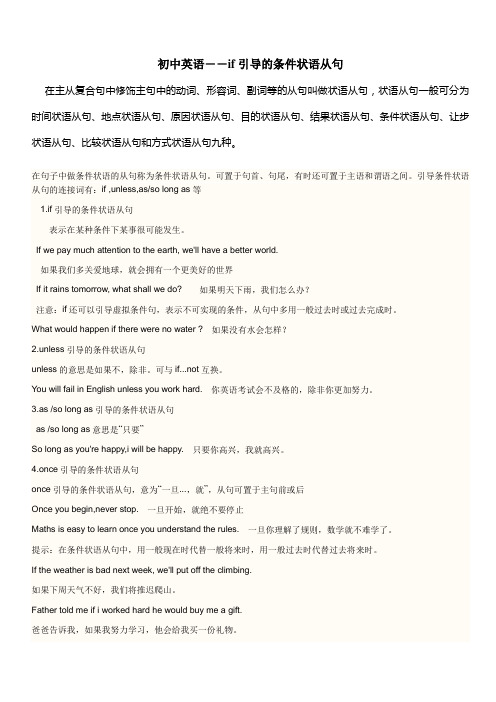
初中英语――if引导的条件状语从句在主从复合句中修饰主句中的动词、形容词、副词等的从句叫做状语从句,状语从句一般可分为时间状语从句、地点状语从句、原因状语从句、目的状语从句、结果状语从句、条件状语从句、让步状语从句、比较状语从句和方式状语从句九种。
在句子中做条件状语的从句称为条件状语从句。
可置于句首、句尾,有时还可置于主语和谓语之间。
引导条件状语从句的连接词有:if ,unless,as/so long as等1.if引导的条件状语从句表示在某种条件下某事很可能发生。
If we pay much attention to the earth, we'll have a better world.如果我们多关爱地球,就会拥有一个更美好的世界If it rains tomorrow, what shall we do? 如果明天下雨,我们怎么办?注意:if还可以引导虚拟条件句,表示不可实现的条件,从句中多用一般过去时或过去完成时。
What would happen if there were no water ? 如果没有水会怎样?2.unless引导的条件状语从句unless的意思是如果不,除非。
可与if...not互换。
You will fail in English unless you work hard. 你英语考试会不及格的,除非你更加努力。
3.as /so long as引导的条件状语从句as /so long as意思是“只要”So long as you're happy,i will be happy. 只要你高兴,我就高兴。
4.once引导的条件状语从句once引导的条件状语从句,意为“一旦...,就”,从句可置于主句前或后Once you begin,never stop. 一旦开始,就绝不要停止Maths is easy to learn once you understand the rules. 一旦你理解了规则,数学就不难学了。
初中语法 if引导的条件状语从句

学习目标:1、了解并掌握if引导的条件状语从句的意思2、了解并掌握if引导的条件状语从句的位置3、了解并掌握if引导的条件状语从句的用法一、if引导的条件状语从句的意思如果....,就....二、if引导的条件状语从句的位置有几种情况1、if you go to London, make sure you visit the Science Museum.2、She will go to America for English study if Mary passes the exam.3、If it rains tomorrow, we will have a picnic next week.4、Work hard if you want to succeed.5、He thinks it will go wrong if I play games on it.分析一下结构:____________________________________________________________________________练习:判断下列句子的主从句1.if you go to London, make sure you visit the Science Museum.2.She will go to America for English study if Mary passes the exam.3.If it rains tomorrow, we will have a picnic next week.4.Work hard if you want to succeed.5.He thinks it will go wrong if I play games on it.三、if引导的条件状语从句的用法(A)1.If you ever go to London, make sure you visit the Science Museum.2.Work hard if you want to succeed.3.If you don’t like watching TV, reading a book.4.Put on some warm clothes if the weather gets colder.5.If you do not feel well, please go to see the doctor.总结:______________________________________练习:1.If you _________(want) to see old machines _________(go) to museum.2.If you _________(visit) London,_________(take) a boat trip on the river.3.If the computer does not _________(start) immediately,_________(wait) for one minute.4.If the weather_________(get) colder,_________(put) on warm clothes.5.If any student_________(have) a high fever,_________(send) him/her to the school doctor at once.6.If you_________(want) to know how it works,_________(read) the book.(B)1.If I start after dinner, I’ll finish it before I go to bed.2.If you do all these other things, you won’t have time to study.3.If you offer to do some housework, he will realise that you are very sorry.4.He thinks it will go wrong if I play games on it.总结:____________________________________________________________________________Join the sentence with if.例:Listen in class, or you will not understand what to do.→If you do not listen in class, you will not understand what to do.1.Eat breakfast, or you will get hungry at school._____________________________________________________________________ 2.Hurry up!You will be late._____________________________________________________________________ 3.Read the book carefully.Then you will not make mistakes._____________________________________________________________________ 4.Don’t watch too much TV, or your eyes will hurt._____________________________________________________________________ 5.Work harder! You will get higher marks._____________________________________________________________________练习:用所给动词的适当形式填空。
初中英语知识点总结条件状语从句

引导条件状语从句的连接词主要有:if(如果)、unless(除非)或as long as(只要)等。
unless在意思上等于if...not。
一、条件状语从句用法1、引导条件状语从句最常用的连词是if,由if引导的条件状语从句表示在某种条件下某事很可能发生。
如:If you ask him, he will help you.如果你请他帮忙,他会帮你的。
If you fail in the exam, you will let him down.如果你考试不及格,你会让他失望的。
另外,if从句还表示不可实现的条件或根本不可能存在的条件,也就是一种虚拟的条件或假设,从句多用一般过去时或过去完成时。
如: If I were you, I would invite him to the party.如果我是你,我会邀请他参加聚会。
2、unless = if...not.除非,若不,除非在……的时候例如:Let's go out for a walk unless you are too tired.=If you are not too tired, let's go out for a walk.Unless it rains, the game will be played.除非下雨,比赛将照常进行。
3、so/as long as只要例句;You may borrow my book as long as you keep it clean. 只要你保持书的清洁,你就可以把我的书借去。
So long as you’re happy, it doesn’t matter what you do. 只要你高兴,你做什么都没有关系。
二、时态问题在条件状语从句中,要注意“主将从现”的规定,即主句用一般将来时,从句用一般现在时表示将来时。
例句:I will come to see you if I have time. 我有时间,我就来看你。
初三英语—期末冲刺:if的用法及定语从句

初三期末冲刺易错点:if的用法及定语从句一、期末备考建议期末考试主要考查牛津课本U5-U8的语法点。
对同学要求比较高,同学们在复习时,一定要对if的用法格外重视。
另外,同学们在做题时,要结合句子意思来理解,判断考查if的意思,从而判断句子的用法。
切记读题时,一定要结合上下语境,读全,读清题意。
二、期末易错知识点1、if的用法考频★★★★★注意:(1) 易错点:if引导的从句中的时态判断,需要根据if的实际意义,判断从句中的时态(2) 在表示某个情形总会出现相同的结果时,if主从句都用一般现在时。
If you don't eat, you get ill. 如果你不吃饭,会生病的。
(3) if常出现于单选和词汇的适当形式填空,偶尔会结合被动语态,这时需要格外注意理解句子意义,避免出现“我不知道如果明天会下雨”这类翻译。
(4) 条件状语从句常用引导词有:if, unless, as soon as, as long as, once.as long as(只要), once(一旦)这两组引导词初中出现的频率比较低,了解即可。
(5) if和whether都有“是否”的意思。
当表示“是否”时,绝大多数情况下,whether可以替代if。
2. unless 的用法(1) unless引导条件状语从句,相当于if条件句的否定,意为“除非;如果不...”。
if ...not = unless ;(2) unless 引导条件状语从句时,判断从句中的动词时态时,需考虑“主将从现”的情况;(3) “祈使句(肯定)+or (else)/ otherwise + 陈述句” 与“unless条件句+主句”有时可以互换。
Buy our coats on November 11th,or you will pay more tomorrow.= Unless you buy our coats on November 11th, you will pay more tomorrow.= If you don't buy our coats on November 11th, you will pay more.如果你不在双十一买我们的衣服,明天你会付更多的钱。
if用法归纳
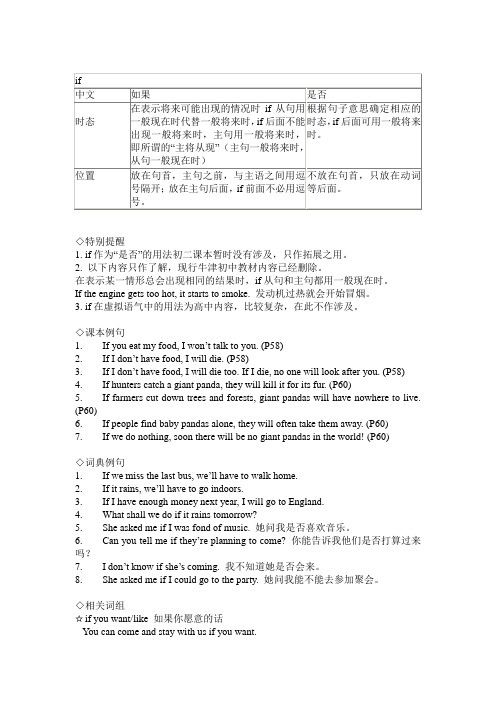
◇特别提醒1. if作为“是否”的用法初二课本暂时没有涉及,只作拓展之用。
2. 以下内容只作了解,现行牛津初中教材内容已经删除。
在表示某一情形总会出现相同的结果时,if从句和主句都用一般现在时。
If the engine gets too hot, it starts to smoke. 发动机过热就会开始冒烟。
3. if在虚拟语气中的用法为高中内容,比较复杂,在此不作涉及。
◇课本例句1. If you eat my food, I won’t talk to you. (P58)2. If I don’t have food, I will die. (P58)3. I f I don’t have food, I will die too. If I die, no one will look after you. (P58)4. If hunters catch a giant panda, they will kill it for its fur. (P60)5. If farmers cut down trees and forests, giant pandas will have nowhere to live. (P60)6. If people find baby pandas alone, they will often take them away. (P60)7. If we do nothing, soon there will be no giant pandas in the world! (P60)◇词典例句1. If we miss the last bus, we’ll have to walk home.2. If it rains, we’ll have to go indoors.3. If I have enough money next year, I will go to England.4. What shall we do if it rains tomorrow?5. She asked me if I was fond of music. 她问我是否喜欢音乐。
初中英语If引导的条件状语从句(可编辑修改word版)
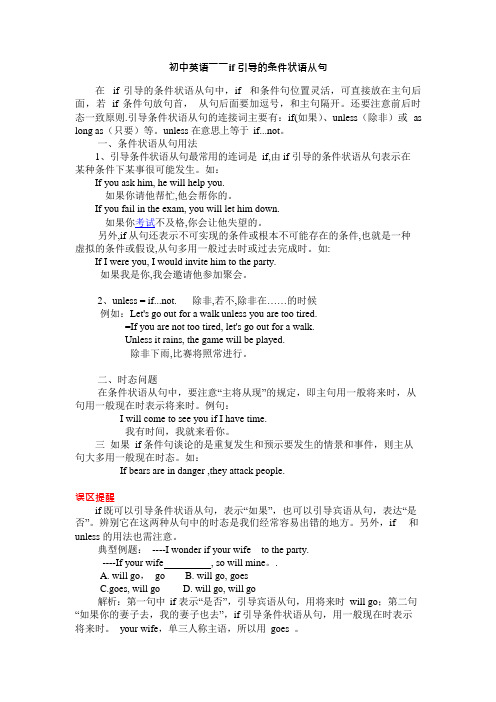
初中英语――if 引导的条件状语从句在if 引导的条件状语从句中,if 和条件句位置灵活,可直接放在主句后面,若if 条件句放句首,从句后面要加逗号,和主句隔开。
还要注意前后时态一致原则.引导条件状语从句的连接词主要有:if(如果)、unless(除非)或as long as(只要)等。
unless 在意思上等于if...not。
一、条件状语从句用法1、引导条件状语从句最常用的连词是if,由if 引导的条件状语从句表示在某种条件下某事很可能发生。
如:If you ask him, he will help you.如果你请他帮忙,他会帮你的。
If you fail in the exam, you will let him down.如果你考试不及格,你会让他失望的。
另外,if 从句还表示不可实现的条件或根本不可能存在的条件,也就是一种虚拟的条件或假设,从句多用一般过去时或过去完成时。
如:If I were you, I would invite him to the party.如果我是你,我会邀请他参加聚会。
2、unless = if...not. 除非,若不,除非在……的时候例如:Let's go out for a walk unless you are too tired.=If you are not too tired, let's go out for a walk.Unless it rains, the game will be played.除非下雨,比赛将照常进行。
二、时态问题在条件状语从句中,要注意“主将从现”的规定,即主句用一般将来时,从句用一般现在时表示将来时。
例句:I will come to see you if I have time.我有时间,我就来看你。
三如果if 条件句谈论的是重复发生和预示要发生的情景和事件,则主从句大多用一般现在时态。
初中if引导的条件状语从句用法

初中if引导的条件状语从句用法条件状语从句用于表示一个条件或前提,它通常由if引导。
条件状语从句通常指的是未来可能发生的事情,它与主句之间存在因果关系。
条件状语从句的基本结构是“if +条件句子,主句”。
其中条件句子可以是陈述句、祈使句或者问句。
例如:-如果你学习努力(条件句子),你会取得好成绩(主句)。
-倘若明天下雨(条件句子),我们就不去度假(主句)。
-要是他来了(条件句子),请告诉他我会晚点到(主句)。
以下是一些拓展用法:1.构造虚拟条件句子:虚拟条件句子用来表达与现实相反的假想情况。
主句的情态动词常常是“would”,而条件句中的动词需使用过去时态。
例如:-如果我有足够的钱(条件句子,现在假设),我就会买一辆新车(主句)。
-如果我能回到过去(条件句子,现在不可能),我会改变很多事情(主句)。
2.使用倒装结构:如果条件句以“had”或是“were”开头时,可以使用倒装结构。
例如:- Had I known you were sick(条件句子),I would have visited you(主句).- Were I taller(条件句子),I could reach the top shelf (主句).3.使用“unless”表示否定条件:除了使用“if”之外,我们也可以使用“unless”来引导否定条件状语从句。
例如:- Unless you study hard(条件句子),you won't pass the test(主句).- We won't have a picnic(主句)unless it stops raining (条件句子).总之,条件状语从句用于表示可能发生的条件情况,其语法结构为“if +条件句子,主句”。
拓展用法包括虚拟条件句子、倒装结构和使用“unless”来表示否定条件。
if引导的条件状语从句精讲与专题练习(2)

八年级英语:i f引导的条件状语从句常见的if条件状语从句表示在某条件下,某事很可能发生,条件是可能存在的,主句中某种情况发生的概率也是很高的。
如:If you ask him,he will help you.如果你请他帮忙,他会帮你的。
If you fail in the exam,you will let him down.如果你考试不及格,你会让他失望的。
If you have finish ed the homewo rk,you can go home.如果你作业做完了就可以回家了。
另外,if从句还表示不可实现的条件或根本不可能存在的条件,也就是一种虚拟的条件或假设。
从句多用一般过去时或过去完成时,表示对现在或过去的一种假设。
如:If I were you,I wouldinvite him to the party.如果我是你,我会邀请他参加聚会。
(不能用was)I wouldhave arrive d much earlie r if I had not been caught in the traffi c.要不是交通堵塞,我本会来得早一些。
另外你还要注意if 条件句的时态搭配1.if从句用一般现在时,主句用一般将来时If he runs ,he’llgettherein time.如果他用跑的,他就会及时赶到那儿。
The cat will scratc h you if you pull her tail.如果你拉猫的尾巴,它就会抓你。
2. if从句用一般现在时,主句用may/might/canIf the fog gets thicke r the planemay/mightbe divert ed.如果雾在大一些,飞机可能就会改在别的机场降落。
if引导的条件状语从句
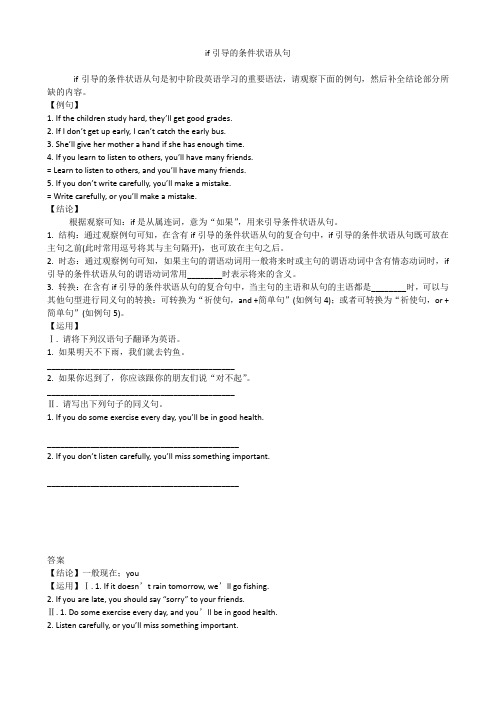
if引导的条件状语从句if引导的条件状语从句是初中阶段英语学习的重要语法,请观察下面的例句,然后补全结论部分所缺的内容。
【例句】1. If the children study hard, they’ll get good grades.2. If I don’t get up early, I can’t catch the early bus.3. She’ll give her mother a hand if she has enough time.4. If you learn to listen to ot hers, you’ll have many friends.= Learn to listen to others, and you’ll have many friends.5. If you don’t write carefully, you’ll make a mistake.= Write caref ully, or you’ll make a mistake.【结论】根据观察可知:if是从属连词,意为“如果”,用来引导条件状语从句。
1. 结构:通过观察例句可知,在含有if引导的条件状语从句的复合句中,if引导的条件状语从句既可放在主句之前(此时常用逗号将其与主句隔开),也可放在主句之后。
2. 时态:通过观察例句可知,如果主句的谓语动词用一般将来时或主句的谓语动词中含有情态动词时,if 引导的条件状语从句的谓语动词常用________时表示将来的含义。
3. 转换:在含有if引导的条件状语从句的复合句中,当主句的主语和从句的主语都是________时,可以与其他句型进行同义句的转换:可转换为“祈使句,and +简单句”(如例句4);或者可转换为“祈使句,or +简单句”(如例句5)。
【运用】Ⅰ. 请将下列汉语句子翻译为英语。
1. 如果明天不下雨,我们就去钓鱼。
___________________________________________2. 如果你迟到了,你应该跟你的朋友们说“对不起”。
中考英语--if和whether表是否的用法分析

中考英语--if和whether表"是否"的用法分析if 和whether 都可以表示“是否”的意思,在句子中有时可以互换使用,有时不能互换使用。
一、if 和whether可以互换使用的情况(1)引导主语从句并且与形式主语it连用时。
例如:It is not clear to me whether/if she likes the present.我还不清楚她是否喜欢这个礼物。
(2)引导的宾语从句放在主句后面时。
例如:Did you ask whether/if they were going?你问过他们是否要去吗?l'm not sure whether/if 'll have time.我不敢肯定我是否会有时间。
Nobody knows whether/if he likes this birthday present.没有人知道他是否喜欢这份生日礼物。
二、只能用whether 不能用if 的情况(1)引导宾语从句作介词的宾语时,如:lt depends on whether it will snow tomorrow.这取决于明天是否会下雨。
(摘自《初中英语语法大全》p.232)l'm interested in whether he likes English.我关心的是他是否喜欢英语。
(同上摘自《初中英语语法大全》p.232)(2)whether 引导的宾语从句可以放在主句的前面,如:Whether we can really help you, I dont know yet.我们是否能真正帮助你,我还不知道。
(摘自赵俊英《现代英语语法》p.1242)Whether this is true or not, I can't say.这是不是真的,我说不清。
(同上摘自赵俊英《现代英语语法》p.1242)Whether I'll have time l'm not sure at the moment.我是否有时间,目前还不能确定。
2024年初中英语语法专项学习之if引导的从句用法

2024年初中英语语法专项学习之if引导的从句用法if的条件状语从句的用法1.if引导的条件状语从句,在if引导条件状语从句中要用现在时态替代将来时,类似还有连词before,as soon as,while,when等。
2.零条件句/绝对真实条件句(Zero Conditional)零条件句,又叫绝对真实条件句,用于阐述事实。
用来表达在该条件下,结果一定会如此(如规则,客观规律、真理等)。
结构是:If+主语+do/does,主语+do/does。
其从句和主句的谓语动词通常为一般现在时。
3.第一条件句/相对真实条件句(First Conditional)第一条件句又叫相对真实条件句,谈论将来可能发生的事情,并考虑这件事情的结果。
强调偶然性或一次性的条件,也可以与绝对真实条件句同义。
if从句用一般现在时或其他现在时,表示将来可能发生的事情(条件);主句用一般将来时,表示这件事情的结果。
结构是:If+主语+do/does,主语+will do。
4.第二条件句/现在虚拟条件句(Second Conditional)第二条件句是虚拟条件句的一种,即现在虚拟条件句(Unreal Present),用来表达在现在或将来时间下不太可能或不可能发生的条件,这种条件句还可以用来表示试探性的、委婉的语气(可以理解为不大有自信,所以不太真实的条件)。
结构是:①与将来事实相反的非真实条件句是If+主语+should do/were to do/did,主语+would/should/could/might do;②与现在事实相反的非真实条件句是If+主语+did,主语+would/should/could/might+do。
5.第三条件句/过去虚拟条件句(Third Conditional)第三条件句是表示与过去事实相反的虚拟语气,是用来表达如果(If)当时那样发生,另外一方面(当时)结果会如何。
通常是指过去的事情,带有一切已经太迟而不能够补救的意思。
初中语法之if条件状语从句

if条件句歌诀
If I were to go abroad ,I would go to America.
如果我出国了,我会去美国。
exercises
(B )1. Be careful, if you______ want to make mistakes.
A. won’t B. don’t C. didn’t D. not
初中语法之if条件状语从句
If 条件状语从句
句型结构
主句+if条件状语从句 if条件状语从句,+主句(从句后加逗号)
时态
if条件状语从句要用一般现时。
Look and say
If I’m hungry,
I will_e_a_t_s_o_m__e__fo_o_d__.
If I’m tired,
I will__h_a_v_e_a__r_e_s_t __.
-- I will if I_____ free.
A. will come; am B. come; am C. will come; will be
( D )4. I don’t know if______ tomorrow.
A. it doesn’t rain
B. the rain will stops
Look and say
If I’m ill, _I_w_i_l_l _s_e_e__a_d_o__c_to__r_.
if用法归纳
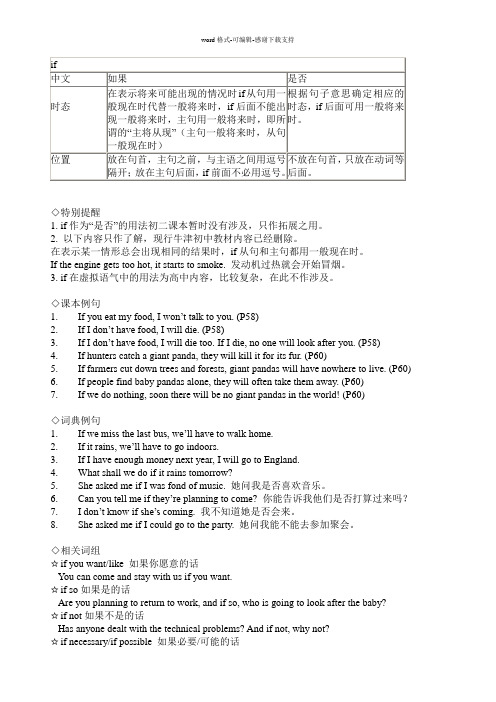
◇特别提醒1. if作为“是否”的用法初二课本暂时没有涉及,只作拓展之用。
2. 以下内容只作了解,现行牛津初中教材内容已经删除。
在表示某一情形总会出现相同的结果时,if从句和主句都用一般现在时。
If the engine gets too hot, it starts to smoke. 发动机过热就会开始冒烟。
3. if在虚拟语气中的用法为高中内容,比较复杂,在此不作涉及。
◇课本例句1. If you eat my food, I won’t talk to you. (P58)2. If I don’t have food, I will die. (P58)3. I f I don’t have food, I will die too. If I die, no one will look after you. (P58)4. If hunters catch a giant panda, they will kill it for its fur. (P60)5. If farmers cut down trees and forests, giant pandas will have nowhere to live. (P60)6. If people find baby pandas alone, they will often take them away. (P60)7. If we do nothing, soon there will be no giant pandas in the world! (P60)◇词典例句1. If we miss the last bus, we’ll have to walk home.2. If it rains, we’ll h ave to go indoors.3. If I have enough money next year, I will go to England.4. What shall we do if it rains tomorrow?5. She asked me if I was fond of music. 她问我是否喜欢音乐。
if后面接什么时态

if后面接什么时态if有如果,倘若等意思,那么if后面接什么时态呢?下面是店铺为你整理的if后面接的时态的相关资料,希望大家喜欢!if后接的时态一般现在时1. 当if后面接一般现在时的动词时,表示对将来的一种推测. if sb do sth sb will/shall do sth. If you go with me, you shall be rewarded.2. 当if后面接一般过去时的动词时,则是一种虚拟语气. if sb did sth sb...if从句的时态if有两个意思:“是否”和“如果”.当做“是否”讲时一般引导宾语从句,时态依据时间状语来做决定, 如:I don't know if he will come tomorrow.当做“如果”讲的时候,又分为两种情形:1.真实性条件状语从句,此时遵循“主将从现”原则,即主句用将来时,而if条件状语从句用一般现在时来代替将来时.如:If it doesn't rain tomorrow,I will go shopping with my friends.2.虚拟性条件状语从句,初中阶段常接触对现在和对将来的虚拟,此时主句多用过去将来时(would+动词原形),而从句用一般过去时(V-ed).如:If I knew his telephone number,I would tell you.if从句的三种用法1、主将从现 (主句为一般将来时,从句为一般现在时);eg:If it rains(从句) ,I will stay at home(主句).=I will stay at home if it rains.2、主句含有情态动词 (must、may、can etc.)从句为一般现在时;eg:If you drive too fast ,you may have an accident.=You may have an accident if you drive too fast3、主句为祈使句,从句要用一般现在时态;eg:Don't play computer games if you don't finish your homework.备注:1、If 于句首时中间用逗号隔开,主句后不用逗号.2、if 可用unless(除非...) 替换.unless= if...not...3、注意虚拟语气主句和从句都为一般过去式eg:If I was a bird ,I could fly.(事实我不可能是鸟)。
初中英语If引导的条件状语从句

初中英语――if引导的条件状语从句在if 引导的条件状语从句中,if 和条件句位置灵活,可直接放在主句后面,若if 条件句放句首,从句后面要加逗号,和主句隔开。
还要注意前后时态一致原则.引导条件状语从句的连接词主要有:if(如果)、unless(除非)或as long as (只要)等。
unless在意思上等于if...not。
一、条件状语从句用法1、引导条件状语从句最常用的连词是if,由if引导的条件状语从句表示在某种条件下某事很可能发生。
如:If you ask him, he will help you.如果你请他帮忙,他会帮你的。
If you fail in the exam, you will let him down.如果你考试不及格,你会让他失望的。
另外,if从句还表示不可实现的条件或根本不可能存在的条件,也就是一种虚拟的条件或假设,从句多用一般过去时或过去完成时。
如:If I were you, I would invite him to the party.如果我是你,我会邀请他参加聚会。
2、unless = if...not.除非,若不,除非在……的时候例如:Let's go out for a walk unless you are too tired.=If you are not too tired, let's go out for a walk.Unless it rains, the game will be played.除非下雨,比赛将照常进行。
二、时态问题在条件状语从句中,要注意“主将从现”的规定,即主句用一般将来时,从句用一般现在时表示将来时。
例句:I will come to see you if I have time.我有时间,我就来看你。
三如果if 条件句谈论的是重复发生和预示要发生的情景和事件,则主从句大多用一般现在时态。
如:If bears are in danger ,they attack people.误区提醒if 既可以引导条件状语从句,表示“如果”,也可以引导宾语从句,表达“是否”。
初中if的用法总结

初中if的用法总结if是Python语言中的条件判断语句,用于在程序中根据条件的真假来执行不同的代码块。
它在编程中是非常常用的,可以说是初学者必学的内容之一。
下面是if的用法总结与解释,希望对你学习和理解if语句有所帮助。
一、基本用法:1. if语句的语法格式如下:if 条件:代码块1else:代码块2其中,if后面的条件是一个表达式,可以是布尔表达式、关系表达式、逻辑表达式等,根据条件的真假来执行相应的代码块。
2. 代码块的缩进:在Python中,代码块必须使用相同的缩进来标识。
一般情况下,使用四个空格缩进,也可以使用一个制表符来进行缩进。
二、条件判断:1. 比较运算符:用于比较两个表达式的关系,包括等于(==)、不等于(!=)、大于(>)、小于(<)、大于等于(>=)、小于等于(<=)等。
2. 逻辑运算符:用于连接两个或多个条件,包括与(and)、或(or)、非(not)三种运算符。
可以用来判断多个条件的组合情况。
三、多重判断:1. 多个if语句的连续使用:可以使用多个if语句来判断不同的条件,每个if语句都需要根据条件的真假来决定是否执行相应的代码块。
如果有多个条件成立,会执行多个代码块。
2. if-elif-else语句:elif是else if的缩写,可以在if-else结构中使用多个elif来进一步判断其他条件。
它与if的逻辑区别是,elif只有在前面的所有条件不成立时才会被判断。
四、嵌套判断:1. if语句的嵌套:在if语句中嵌套使用if语句,可以根据不同的条件判断执行不同的代码块。
内层的if语句也需要根据其条件的真假来判断是否执行相应的代码块。
2. if-else语句的嵌套:在if-else语句中嵌套使用if-else语句,可以根据不同的条件判断执行不同的代码块。
内层的if-else语句也需要根据其条件的真假来判断执行哪个代码块。
五、总结与注意事项:1. if语句的执行流程是顺序的:根据条件的真假来判断是否执行相应的代码块,遇到第一个满足条件的if语句后,会执行对应的代码块,并结束整个if语句。
初中英语:理解条件状语从句,掌握它的几个引导词
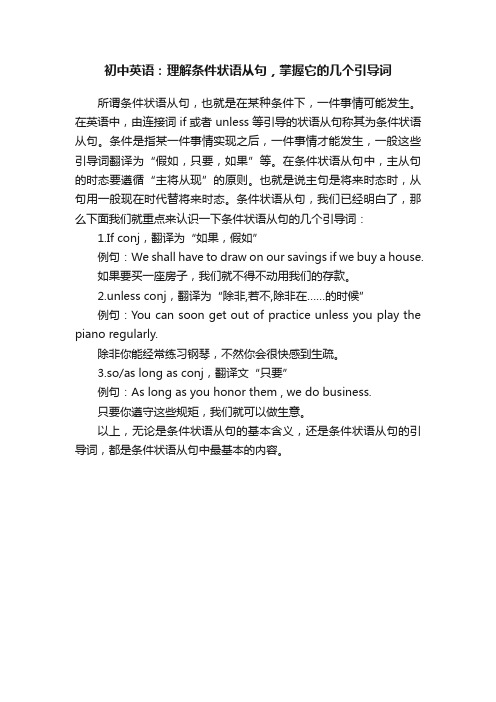
初中英语:理解条件状语从句,掌握它的几个引导词
所谓条件状语从句,也就是在某种条件下,一件事情可能发生。
在英语中,由连接词if或者unless等引导的状语从句称其为条件状语从句。
条件是指某一件事情实现之后,一件事情才能发生,一般这些引导词翻译为“假如,只要,如果”等。
在条件状语从句中,主从句的时态要遵循“主将从现”的原则。
也就是说主句是将来时态时,从句用一般现在时代替将来时态。
条件状语从句,我们已经明白了,那么下面我们就重点来认识一下条件状语从句的几个引导词:
1.If conj,翻译为“如果,假如”
例句:We shall have to draw on our savings if we buy a house.
如果要买一座房子,我们就不得不动用我们的存款。
2.unless conj,翻译为“除非,若不,除非在……的时候”
例句:You can soon get out of practice unless you play the piano regularly.
除非你能经常练习钢琴,不然你会很快感到生疏。
3.so/as long as conj,翻译文“只要”
例句:As long as you honor them , we do business.
只要你遵守这些规矩,我们就可以做生意。
以上,无论是条件状语从句的基本含义,还是条件状语从句的引导词,都是条件状语从句中最基本的内容。
- 1、下载文档前请自行甄别文档内容的完整性,平台不提供额外的编辑、内容补充、找答案等附加服务。
- 2、"仅部分预览"的文档,不可在线预览部分如存在完整性等问题,可反馈申请退款(可完整预览的文档不适用该条件!)。
- 3、如文档侵犯您的权益,请联系客服反馈,我们会尽快为您处理(人工客服工作时间:9:00-18:30)。
if 在初中阶段的用法掌握
1.if ,是否 = whether.
e.g: I don’t know if he comes tomorrow.
My good friend went to Kunming yesterday,I wanted to ask his mother if she would come tomorrow.
2. if, 如果。
a. if引导真实条件状语从句,主句用一般将来时态,从句用一般现在时态,简称主将从现。
e.g: If it is sunny tomorrow, I will go and have a picnic.
If you study English very hard, you will get good greads.
If my uncle comes, he will help us to mend my computer.
b. if 引导虚拟条件状语从句。
如果我们所假设的条件是现在或者将来都不存在,只是虚拟有这一种条件,在这种虚拟条件下,在设想主句主语会发生某种动作或存在有某种状态的,这种条件句就是虚拟条件句。
虚拟条件句的主句用would, could, might, should + 动词原形 (should 用于主语是第一人称I 或者we时,其他不受人称限制),从句用:是be动词的,一律用were + 表语(不
论从句主语人称是什么,be动词一律都用were);是实义动词的,用动词的过去式。
e.g: If I were you, I would wear a tie and shirt. If he were his math teacher, he would give his students another solution.
-- Tomorrow is my mother’s birthday, what should I give my mother?
-- If I were you, I would give her a scarf.
If it rained a lot on drying days, the farmers wouldn’t be so worried.
If our parents studied at school instead of us, what would they do?。
